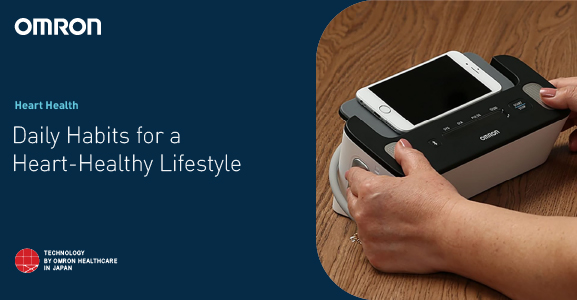Daily Habits for a Heart-Healthy Lifestyle
May 10, 2024 2024-08-01 14:35Daily Habits for a Heart-Healthy Lifestyle

Daily Habits for a Heart-Healthy Lifestyle
To live a long and healthy life, one must maintain a heart-healthy lifestyle. Heart disease remains one of the leading causes of death worldwide, but many risk factors are modifiable through daily habits. You may dramatically lower your risk of cardiovascular disease by adopting heart-healthy habits.
Well-Balanced Diet
The foundation of a heart-healthy lifestyle is a balanced diet. Aim for at least five servings of fruits and vegetables each day, as they are high in fiber, vitamins, and minerals. Nutrient-dense whole grains including brown rice, whole wheat, and oats also support normal cholesterol levels. Lean protein sources include fish, chicken, beans, and nuts. Salmon and other fatty fish are especially healthy options because of their high omega-3 fatty acid concentration. Replace saturated and trans fats found in processed foods with healthy fats such those found in nuts, avocados, and olive oil. Furthermore, cutting back on sugar and salt is essential since too much sugar can cause weight gain and diabetes and too much sodium can raise blood pressure.
Regular Exercise
It is essential to be physically active to keep your heart healthy. Aim for at least 75 minutes of intense exercise or 150 minutes of moderate-intensity aerobic activity per week. Cardiovascular exercise can be enhanced by brisk walking, cycling, swimming, or running. Exercise lowers the load on your heart, helps you maintain a healthy weight, lowers blood pressure, and improves your cholesterol levels by raising HDL (good cholesterol) and lowering LDL (bad cholesterol). You can keep an eye on your improvement by using a blood pressure monitor to measure your readings before and after workouts. Accurate readings are provided by a digital blood pressure monitor, which may also help you modify your exercise level as needed.
Regular Health Check-Ups
For the early identification and treatment of heart disease risk factors, routine health examinations are crucial. By using a blood pressure monitor at home on a regular basis, you can monitor your blood pressure and take early action if issues develop. If you have a history of heart illness, routine ECG testing is very crucial since an ECG equipment can identify irregular heartbeats or other heart problems. Purchasing home monitoring equipment, such as an ECG machine and blood pressure monitor, might help you to regularly check on the condition of your heart.
Stress Management
Stress management is crucial to preserving cardiovascular health as long-term stress can negatively impact your heart. Effective methods include physical activity, which not only benefits the heart directly but also reduces stress, practicing mindfulness and meditation, which can both lower stress and improve heart health, and getting enough sleep-aiming for seven to nine hours each night- to help your body recover from daily stressors. You may better detect and manage stress causes with a digital blood pressure monitor to track your heart’s reaction to stress.
Avoid Smoking & Limit Alcohol
Limiting alcohol use and quitting smoking are also essential for heart health. Giving up smoking can greatly improve heart health because it is a key risk factor for heart disease. In a similar way, overindulging in alcohol can result in hypertension, heart failure, and other cardiovascular problems. To stop smoking, join support groups, try nicotine replacement treatments, and ask medical professionals for assistance. You can notice how giving up smoking or consuming less alcohol affects your blood pressure by using a blood pressure monitor regularly.
Maintain A Healthy Weight
Heart health depends on maintaining a healthy weight through nutrition and activity. To keep consistent weight, eat a balanced diet and take part in frequent, enjoyable physical activity. You may keep track of how changes in weight impact on your blood pressure by using a BP monitor to monitor your progress. Being well hydrated is also crucial for heart health since water keeps the blood volume stable and promotes the cardiovascular system’s general health. Keep a water bottle with you and try to consume eight glasses or more of water each day, varying your amount according to the weather and degree of exercise.
Your risk of cardiovascular illnesses can be considerably decreased by implementing heart-healthy daily routines. The cornerstones include stress management, a well-balanced diet, frequent exercise, and abstaining from tobacco and excessive alcohol. Furthermore, for the early diagnosis and treatment of heart health problems, routine physical examinations and at-home monitoring, using devices such as an ECG machine, blood pressure monitor, and digital blood pressure equipment are essential. By incorporating these habits into your daily routine, you can maintain a healthy heart and enjoy a longer, more active life. Stay proactive about your heart health, and remember that small, consistent changes can lead to significant long-term benefits.






